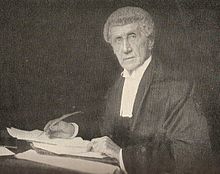- Common Serjeant of London
-
The Common Serjeant of London (full title The Serjeant-at-Law in the Common Hall) is an ancient British legal office, first recorded in 1317, and is the second most senior permanent judge of the Central Criminal Court after the Recorder of London, acting as deputy to that office, and sitting as a judge in the trial of criminal offences.
The Common Serjeant is appointed by the Crown on the recommendation of the Lord Chancellor.
The Common Serjeant aids the Recorder at the Central Criminal Court, acts as judge at the Mayor's Court and legal adviser and counsel to the City of London Corporation, and performs certain functions at the election of city officers.
Formerly, the Common Serjeant of London was a legal officer of the City Corporation of London. The Common Serjeant of London attended on the Lord Mayor of London and the Court of Aldermen on court days, and acted with them in council. He also attended the Court of Aldermen and Common Council, and had charge of the Orphans' Estates[1]
The present Common Serjeant is His Honour Judge Brian Barker QC, who is the 79th person to hold that office.
Contents
Gallery
-
Sir Robert Broke, Common Serjeant of London in 1536
-
Judge George Jeffreys, Common Serjeant of London in 1671
-
Lord Denman, Common Serjeant of London 1822 - 1830
-
Judge Brian Barker QC, Common Serjeant of London 2005 to date
Incomplete List of Common Serjeants
- William de Ford (1333-1353)[2]
- John Wentbrigg (c.1353-1362)
- Ralph Strode (c.1375-1385)
- John Tremayne (c.1389)
- John Wilton
- Robert Danvers
- Richard Moyle
- Thomas Bylling
- John Nedeham
- Thomas Urswyck
- Robert Ingelton
- Guy Fairfax
- Thomas Rigby
- Thomas Bryan (1460-1463)
- John Baldwyn
- Robert Molyneux, Gent.
- John Haugh, Gent.
- Richard Higham
- Thomas Frowyk (1486-1496)
- Thomas Marowe
- John Greene
- Henry White
- William Walsingham
- John Onely
- Edward Hall
- Robert Southwell
- Robert Brooke
- Thomas Atkyns
- John Marshe (born 1547- died 1563)
- Bernard Randolph
- Thomas Kirton (born 1537 - died 1601)
- Richard Wilbraham
- Richard Wheeler of Lincoln's Inn, Esq
- Daniel Hills, of Lincoln's Inn, Esq
- Thomas Jones of Grey's Inn
- Ralph Latham
- Sir Robert Broke (1536-1545)
- Henry Proby (died 1660)
- Sir Richard Browne
- George Jeffreys (1671 - 1678)
- Henry Crispe (c.1678)
- Duncan Dee (c.1700)
- John Lingard (c.1720)
- Thomas Garrard (c.1729)
- Thomas Nugent (c.1758)
- John Silvester (c.1790)
- Newman Knowlys (c.1803)
- Thomas Denman, 1st Baron Denman (1822-1830)
- John Mirehouse (1833-1850)[3]
- Hon. Charles Ewan Law (c.1833)
- Sir William Thomas Charley (1878 - 1892)
- Sir Forrest Fulton (1892-1900)
- Sir Frederick Albert Bosanquet, MA, KC, JP (1900-1917)
- Sir Henry Fielding Dickens KC (1917-1932)
- Cecil Whiteley (1934-1942)
- Sir Carl Douglas Aarvold (1959-1964)[4]
- Mervyn Griffith-Jones CBE MC QC (1964-1979)
- Sir John Leonard (1979-1993)[5]
- Neil Denison QC (1993-2001)
- Peter Beaumont QC (2001-2004)
- Brian Barker QC (2005-present)
References
- ^ The Book of Dignities: Containing Rolls of the Official Personages of the British Empire ... from the Earliest Periods to the Present Time ... Together with the Sovereigns of Europe, from the Foundation of Their Respective States; the Peerage of England and Great Britain ... by Joseph Haydn and Joseph Timothy Haydn Published by Longmans, Brown, Green, and Longmans, 1851
- ^ [1] John Strype's Survey of the Cities of London and Westminster
- ^ Mirehouse, John [Cambell] in Venn, J. & J. A., Alumni Cantabrigienses, Cambridge University Press, 10 vols, 1922–1958.
- ^ [2] British Army Officers 1939-1945
- ^ [3] Obituary in The Telegraph
External links
Categories:- English law
- Law in the United Kingdom
- Common law
- Common Serjeants of London
- Legal professions
-
Wikimedia Foundation. 2010.





